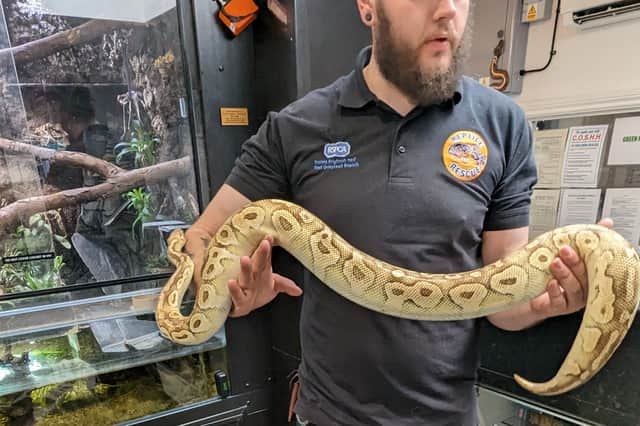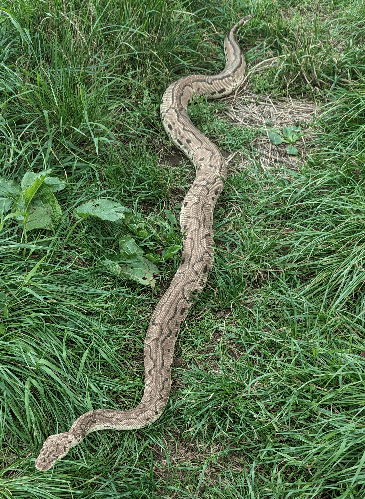Snakes in West Sussex: RSPCA hunting for rumoured third giant snake - after two more pythons rescued
and live on Freeview channel 276
The RSPCA is trying to track down a third large python spotted in West Ashling village in 10 days - which may be either abandoned or escaped pets.
The first of the snakes was rescued from a field by Sussex RSPCA staff on 18 September, while the second - a four-foot royal python - was found curled up under a bush by a horse rider on Sunday (24 September).
Advertisement
Hide AdAdvertisement
Hide AdRSPCA animal rescue officer Claire Thomas rescued the snake and transferred it to a vet for a check-up. However, on Thursday (28 September) the charity received a report that a 3.5-foot long python had been spotted in the village.
When an officer arrived to collect the snake, the animal could no longer be found. The RSPCA do not know yet whether the incidents are related, but the RSPCA was concerned about so many large snakes being found over such a short space of time.


“It’s not very often that we get called out to incidents involving large stray snakes so it may be that these incidents are related, though we cannot be sure at this stage," Ms Thomas said.
She said the public had nothing to fear. “We don’t want to cause panic to anyone as royal pythons are not venomous snakes. It concerns us that these snakes have been outdoors just as the weather is getting cooler, as snakes need to be kept warm.”
Advertisement
Hide AdAdvertisement
Hide AdPet snake species like royal pythons are completely dependent on their owners, she said, for safe homes with the correct heating, lighting and feed, all of which must replicate their wild habitat as closely as possible to keep them healthy.
Without proper care they can suffer from serious diseases, dehydration, injuries, parasites, and in severe cases, they can eventually die.


Ms Thomas said if anyone had any information on these snakes, to please get in touch with the local RSPCA on 0300 123 8018.
"Or if they are escaped pets and you believe you are the owner, you can get in touch on the same number," she added. If anyone in the area finds a snake they believe is non-native, the RSPCA’s advice is to keep a safe distance, monitor it, and visit the charity’s website for advice.
Advertisement
Hide AdAdvertisement
Hide AdEvie Button, the RSPCA's senior scientific advisor, said: “Snakes are excellent escape artists and will take the opportunity of a gap in an enclosure door, or a loose-fitting lid to make a break for it.
“Last year, we took more than one thousand reports about snakes, with the highest number of calls coming in during the summer months. This is not surprising, as snakes become more active during hot weather," she continued.
“The RSPCA urges all pet snake owners to be extra vigilant, invest in an enclosure suitable for the particular species and make sure that enclosure is kept secure - and locked if necessary - when unattended.”
While many of the snakes the RSPCA’s officers are called to collect are escaped pets, Ms Button said sadly, they have also had to deal with plenty of abandoned snakes.
Advertisement
Hide AdAdvertisement
Hide Ad"We find that many people are unaware of how much of a commitment these animals are when they take them on, which we believe contributes to the hundreds of animals every year who have sadly been abandoned when their owners can no longer meet their needs.”
Comment Guidelines
National World encourages reader discussion on our stories. User feedback, insights and back-and-forth exchanges add a rich layer of context to reporting. Please review our Community Guidelines before commenting.
